UPSC Daily Current Affairs- 12 December 2023 | Current Affairs & Hindu Analysis: Daily, Weekly & Monthly PDF Download
GS-I
Syama Prasad Mookerjee and his Contributions
Subject: Modern History
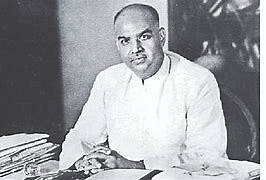
Why in News?
Following judgment of the Supreme Court upholding the abrogation of Article 370, many invoked Dr Syama Prasad Mookerjee (1901-53), an ardent opponent of Kashmir’s ‘special status’ in the Indian Union.
Who was Syama Prasad Mookerjee?
- Syama Prasad Mookerjee, an eminent Indian politician, barrister, and academician, played a significant role in shaping India’s political landscape during the mid-20th century.
- Born on July 6, 1901, in Kolkata (formerly Calcutta), Mookerjee emerged as a prominent leader and a staunch advocate of Indian nationalism and Hindu politics.
Early Life and Education
- Bengali Brahmin heritage: Mookerjee hailed from a respected Brahmin family with roots in Jirat, Hooghly District, and West Bengal.
- Academic brilliance: He exhibited exceptional academic prowess, pursuing his education at prestigious institutions such as Presidency College and the University of Calcutta.
- Legal career: Mookerjee became a barrister, being called to the English Bar after studying at Lincoln’s Inn in London.
Political Career
- Initial association with Congress: Mookerjee began his political journey as a member of the Indian National Congress, representing Calcutta University in the Bengal Legislative Council.
- Hindu Mahasabha affiliation: He later joined the Hindu Mahasabha, a right-wing Hindu nationalist organization, and became its president.
- Championing Bengal partition: Mookerjee actively advocated for the partition of Bengal to safeguard Hindu interests, leading to the establishment of a separate West Bengal within the Indian Union.
- Resignation from Bengal cabinet: As Finance Minister of Bengal Province, Mookerjee resigned in 1942, condemning the British government’s oppressive policies and their attempts to hold on to India.
Contributions to Independent India
- Minister for Industry and Supply: Mookerjee served as India’s first Minister for Industry and Supply in Jawaharlal Nehru’s cabinet after independence.
- Nehru-Liaquat Pact and resignation: He resigned from Nehru’s cabinet in 1950, protesting against the Nehru-Liaquat Pact, which he believed compromised the interests of Hindus in East Bengal (now Bangladesh).
- Founding Bharatiya Jana Sangh: Mookerjee, with the support of the Rashtriya Swayamsevak Sangh (RSS), established the Bharatiya Jana Sangh in 1951, laying the foundation for the Bharatiya Janata Party (BJP).
Mookerjee’s Opposition to Article 370
- Balkanization of India: Mookerjee strongly believed that Article 370 created a sense of separatism and division within the country, leading to the fragmentation of India’s unity.
- Rejection of dual governance: Mookerjee famously stated, “Ek desh mein do Vidhan, do Pradhan aur Do Nishan nahi chalenge” (One country cannot have two constitutions, two prime ministers, and two flags), emphasizing his opposition to the separate status enjoyed by Jammu and Kashmir.
- Reservations about special status: Mookerjee expressed concerns that the special status granted to Jammu and Kashmir under Article 370 would impede the state’s full integration into the Indian Union.
- Inequality and separatism: He believed that granting special privileges to one state based on religion or regional factors would lead to a sense of inequality and separatism.
Ideological Stance and Legacy
- Influence on BJP’s policy agenda: His ideology and vision continue to shape the policies and agenda of the Bharatiya Janata Party.
- Controversial demise: Mookerjee’s untimely death in 1953 while in custody remains a subject of controversy and speculation, with demands for an independent inquiry.
Source: The Hindu
GS-II
Article 370 abrogation upheld
Subject: Polity and Governance
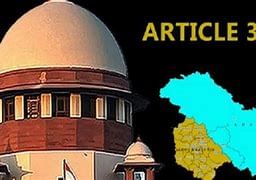
Why in News?
The Supreme Court in a 5-0 unanimous ruling upheld the Centre’s abrogation of Article 370 of the Constitution.
Article 370
- About
- Article 370 is the first article of Part XXI of the Constitution - ‘Temporary, Transitional and Special Provisions’.
- It exempts J&K from the application of the Constitution of India (except Article 1 and Article 370 itself) and permits the state to draft its own Constitution.
- It restricts Parliament’s legislative powers in respect of J&K and for extending a central law on subjects included in the Instrument of Accession (IoA), mere “consultation” with the state government is needed.
- Timeline
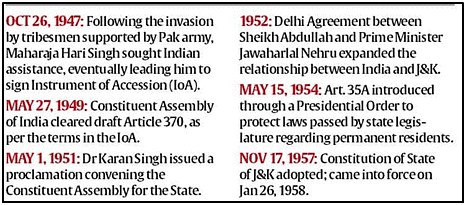
Abrogation of Article 370
- On 5 August 2019, the Indian government revoked nearly all of Article 370 of the Indian constitution.
- On August 5th, the President issued The Constitution (Application to Jammu And Kashmir) Order, 2019.
- This order replaced the term ‘Constituent Assembly’ from Article 370(3) with ‘Legislative Assembly [of Jammu & Kashmir]’.
- The Order technically amended the interpretation clause Article 367, not Article 370 itself (it used Article 370(1) to do so).
- This order replaced the term ‘Constituent Assembly’ from Article 370(3) with ‘Legislative Assembly [of Jammu & Kashmir]’.
- Later, a Statutory Resolution was introduced in the Rajya Sabha that abrogated most of Article 370.
- This was possible without the Jammu & Kashmir Legislative Assembly’s concurrence because the State was under President’s rule.
- On 6 August, Parliament passed the Jammu and Kashmir Reorganisation Bill, 2019 that bifurcates the State into two Union Territories: Jammu & Kashmir and Ladakh.
- The former is provided with a legislative assembly.
Background of the current judgement
- Multiple petitions were filed after the abrogation of Article 370.
- On 28 August 2019, the SC agreed to hear multiple petitions challenging the abrogation of Article 370 and the subsequent bifurcation of J&K into two UTs.
- It constituted a five-judge bench for the same.
News Summary: Article 370 abrogation upheld
- The Supreme Court gave its verdict on the Union government’s 2019 move to amend Article 370 of the Constitution.
- The abrogation ended the special status conferred to the erstwhile state of Jammu and Kashmir.
- The court held the Constitutional order that revoked Article 370 as valid.
Key highlights of the judgement
- On the ‘unique’ and ‘special status’ of Jammu and Kashmir
- The SC held that J&K did not retain any element of sovereignty after its accession to India in 1947.
- The court said that although Maharaja Hari Singh, the erstwhile ruler of the princely state, issued a proclamation that he would retain his sovereignty.
- However, his successor Karan Singh issued another proclamation that the Indian Constitution would prevail over all other laws in the state.
- On 25 November 1949, a Proclamation was issued for the State of Jammu and Kashmir by Yuvraj Karan Singh.
- It stated that the Government of India Act, 1935, which until then governed the constitutional relationship between J&K and the dominion of India, will stand repealed.
- It further stated that the Constitution of India shortly to be adopted by the Constituent Assembly of India shall be applicable to J&K.
- This in essence, had the effect of a merger like every other princely state that joined India, the court ruled.
- Jammu and Kashmir has always been an integral part of India
- CJI Chandrachud cited Section 3 of the J&K Constitution itself, apart from Article 1 and 370 of the Indian Constitution.
- Article 3 of the J&K Constitution reads: “The State of Jammu and Kashmir is and shall be an integral part of the Union of India.”
- Being the only state with its own Constitution also does not define a special status.
- The purpose of J&K Constitution was to ensure everyday governance in the state and the purpose of Article 370 was to integrate the state with India.
- On restoration of statehood
- The court said the reorganisation of the erstwhile state into Union Territories in 2019 was a temporary move.
- Hence, it directed the Centre for the restoration of statehood and for Legislative Assembly elections to be held.
- Article 370 - a temporary or a permanent provision
- The Supreme Court held that Article 370 is a temporary, transitional provision.
- The court said that the temporary provision served a purpose in the war-like situation prevailing in the state in 1947.
- The Supreme Court held that Article 370 is a temporary, transitional provision.
- On the questions relating to the effective abrogation of Article 370
- The Supreme Court upheld both the presidential proclamations of August 2019.
- The court was to decide on the legality of the two Presidential proclamations in 2019 which in effect abrogated Article 370.
- The Court upheld both the proclamations, including the one that gave a new meaning to “constituent assembly of Jammu and Kashmir”, as “Legislative Assembly of Jammu and Kashmir.”
- The central issue was whether these actions could be taken by the Union assuming powers of the state when it is under President’s rule.
- Here, the Supreme Court referred to the landmark 1994 ruling in ‘SR Bommai v Union of India’.
- This case dealt with the powers and limitations of the Governor under President’s rule.
- In the Bommai case, SC held that the Governor can assume “all or any” roles of the state legislature.
- Relying on an interpretation of the Bommai ruling, the SC said that there is no prima facie case that the President’s orders were malafide or extraneous exercise of power.
- The Supreme Court upheld both the presidential proclamations of August 2019.
- Truth and Reconciliation Commission
- Justice Sanjay Kaul, in his opinion, recommended setting up a Truth and Reconciliation Commission to look into alleged violations of human rights by both state and non-state actors in J&K.
- The commission is an official mechanism to not just acknowledge, but also reveal, wrongdoings by a government so that conflicts of the past can be addressed and resolved.
- Justice Sanjay Kaul, in his opinion, recommended setting up a Truth and Reconciliation Commission to look into alleged violations of human rights by both state and non-state actors in J&K.
Source: Indian Express
Karan Singh’s Proclamation of 1949
Subject: Federalism

Why in News?
On December 11, the Supreme Court upheld the abrogation of Article 370, affirming that Jammu and Kashmir (J&K) did not retain sovereignty after joining the Union of India.
- CJI D Y Chandrachud, writing for himself and Justices B R Gavai and Surya Kant, cited a 1949 proclamation by Yuvraj Karan Singh (successor of J&K titular Maharaja) as a key factor in this decision.
Karan Singh’s 1949 Proclamation
- Repeal of the Government of India Act, 1935: The proclamation declared the repeal of the Government of India Act, 1935, which previously governed J&K’s constitutional relationship with India.
- Adoption of the Indian Constitution: It stated that the Indian Constitution would govern J&K’s relationship with the Union of India and abrogate inconsistent constitutional provisions in the state.
Reason behind the Proclamation
- Karan Singh’s Perspective: Speaking to The Indian Express, Karan Singh, aged 92, explained that the proclamation was necessary to eliminate ambiguity regarding J&K’s integration with India.
- Instrument of Accession’s Ambiguity: He noted that while his father, Hari Singh, signed the Instrument of Accession like other rulers, J&K retained a measure of autonomy, leading to questions about its complete integration.
Supreme Court’s Findings
- Essence of the Judgment: The Court stated that J&K did not retain any form of sovereignty upon joining India.
- Significance of the 1949 Proclamation: The Court highlighted that Karan Singh’s proclamation superseded all constitutional provisions inconsistent with the Indian Constitution, effectively surrendering J&K’s sovereignty.
Alignment with the Centre’s Argument
- Centre’s Stance: The Union government argued that the 1949 proclamation acknowledged the supremacy of the Indian Constitution and surrendered sovereignty to it, where the sovereign is ‘We the people of India’.
- Court’s Agreement: The Supreme Court’s ruling aligns with this argument, affirming the complete integration of J&K into India.
Conclusion
- The Supreme Court’s decision clarifies the constitutional status of J&K post the abrogation of Article 370, confirming its full integration into the Indian Union without any retained sovereignty.
- The ruling underscores the historical context of J&K’s accession and the role of the 1949 proclamation in shaping its constitutional relationship with India.
Source: Indian Express
Foreigners’ Tribunals
Subject: Polity and Governance
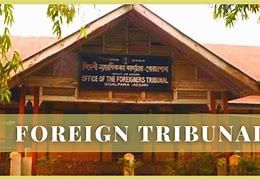
Why in News?
Since 1966, Foreigners Tribunals (FTs) in Assam have identified 32,381 people as foreigners.
Foreigners Tribunals in Assam
- Unique Quasi-Judicial Bodies: FTs are specific to Assam, tasked with determining whether a person is illegally staying as a “foreigner” in India.
- Backdrop of Assam’s NRC: With the National Register of Citizens (NRC) in Assam, the Ministry of Home Affairs (MHA) has outlined guidelines for detecting, detaining, and deporting illegal foreign nationals.
- Amendment to Foreigners (Tribunals) Order, 1964: The MHA has amended this order, allowing district magistrates in all States and Union Territories to establish tribunals.
- Shift in Power: Previously, only the Central Government had the authority to constitute such tribunals.
Need for Foreigners Tribunals
- Legal Process for Foreigners: In other regions, foreigners apprehended for illegal stay are tried under the Passport Act, 1920, or the Foreigners Act, 1946, with penalties including imprisonment and eventual deportation.
- Detention Centers: Post-sentence, the accused are held in detention centers until their country of origin agrees to accept them.
Recent Amendments and Their Implications
- Changes in Tribunal Constitution: The 1964 order initially allowed only the Central Government to refer cases to the Tribunals. The amendment now permits State Governments, UT administrations, District Collectors, and District Magistrates to do so.
- Empowerment of Individuals: The amended Foreigners (Tribunal) Order, 2019, enables individuals to approach Tribunals, a change from the earlier provision where only the State could challenge a suspect.
- Context of NRC: With the final NRC publication, this amendment aims to provide adequate opportunities for those not included in the list.
- Procedure for Non-Listed Individuals: Persons not found in the final NRC can approach the Tribunals. District Magistrates can also refer cases of individuals who haven’t filed claims against their NRC exclusion.
- Issuance of Fresh Summons: These individuals will receive new summons to prove their citizenship.
Source: Indian Express
GS-III
Non-Convertible Redeemable Preference Shares (NCRPS)
Subject: Economy

Why in News?
The Securities and Exchange Board of India (SEBI) recently proposed to permit companies to issue non-convertible debentures (NCDs) and non-convertible redeemable preference shares (NCRPS) with the face value of Rs. 10,000 as against the current system of Rs one lakh face value.
What are Preference Shares?
- Preference shares, more commonly referred to as preferred stock, are shares of a company’s stock with dividends that are paid out to shareholders before common stock dividends are issued.
- If the company enters bankruptcy, preferred stockholders are entitled to be paid from company assets before common stockholders.
- Non-Convertible v/s Convertible Preference Shares:
- Preference shares that can be easily converted into equity shares are known as convertible preference shares.
- Non-Convertible preference shares are those shares that cannot be converted into equity shares.
- Redeemable v/s Non-Redeemable Preference Shares:
- Redeemable preference shares are those shares that can be repurchased or redeemed by the issuing company at a fixed rate and date. These types of shares help the company by providing a cushion during times of inflation.
- Non-redeemable preference shares are those shares that cannot be redeemed or repurchased by the issuing company at a fixed date. Non-redeemable preference shares help companies by acting as a lifesaver during times of inflation.
- Other Types:
- Cumulative preference shares: Some preference shares also receive arrears of dividends, which are called cumulative preference shares.
- Participating preference shares: These help shareholders demand a part in the company’s surplus profit at the time of the company’s liquidation after the dividends have been paid to other shareholders. However, these shareholders receive fixed dividends and get part of the surplus profit of the company along with equity shareholders.
- Non-Participating preference shares: These do not benefit the shareholders the additional option of earning dividends from the surplus profits earned by the company, but they receive fixed dividends offered by the company.
- Adjustable Preference Shares: In the case of adjustable preference shares, the dividend rate is not fixed and is influenced by current market rates.
Key Facts about Debentures:
- A debenture is a type of bond or other debt instrument that is unsecured by collateral.
- Since debentures have no collateral backing, they must rely on the creditworthiness and reputation of the issuer for support.
- Both corporations and governments frequently issue debentures to raise capital or funds.
- Similar to most bonds, debentures may pay periodic interest payments called coupon payments.
- Convertible vs. Nonconvertible:
- Convertible debentures are bonds that can be converted into equity shares of the issuing corporation after a specific period.
- They are attractive to investors that want to convert to equity if they believe the company's stock will rise in the long term.
- However, the ability to convert to equity comes at a price since convertible debentures pay a lower interest rate compared to other fixed-rate investments.
- Nonconvertible debentures are traditional debentures that cannot be converted into equity of the issuing corporation. To compensate for the lack of convertibility investors are rewarded with a higher interest rate when compared to convertible debentures.
Source: Indian Express
What is Radiocarbon Dating?
Subject: Science and Technology
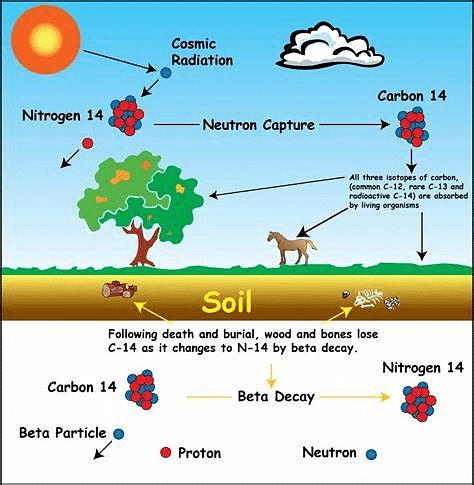
Why in News?
Archaeologists have recently used radiocarbon dating to analyse the oldest true wooden frame saddle in East Asia, revealing how the rise of Mongolian steppe cultures was likely aided by advances in equestrian technology.
About Radiocarbon Dating:
- Radiocarbon dating, or carbon-14 dating, is a scientific method that can accurately determine the age of organic materials as old as approximately 60,000 years.
- First developed in the late 1940s at the University of Chicago by Willard Libby, the technique is based on the decay of the carbon-14 isotope (Carbon-14 is a radioactive isotope of carbon).
- It has been used for historical studies and atmospheric science.
- It can be used on any object that used to be alive. That includes pieces of animals, people, and plants, but also paper that was made from reeds, leather made from animal hides, logs that were used to build houses, and so forth.
- How does it work?
- Carbon 14 is continually being formed in the upper atmosphere by the effect of cosmic ray neutrons on nitrogen 14 atoms. It is rapidly oxidized in air to form carbon dioxide and enters the global carbon cycle.
- Plants and animals assimilate carbon 14from carbon dioxide throughout their lifetimes into their tissues.
- When they die, the carbon-14 starts to change into other atoms over time.
- Scientists can estimate how long the organism has been dead by counting the remaining carbon-14 atoms.
- Carbon-14 has a half-life of about 5,730 years. That means half the atoms in a sample will change into other atoms, a process known as “decay,” in that amount of time.
Source: The Hindu
Oil Producers waters down provision on Fossil Fuel Phase-out
Subject: Environment and Ecology

Why in News?
From 30th Nov to 12th Dec 2023, the Government of the United Arab Emirates is hosting the 28th Conference of the Parties to the United Nations Framework Convention on Climate Change.
Background
- From 30th Nov to 12th Dec 2023, the Government of the United Arab Emirates is hosting the 28th Conference of the Parties to the United Nations Framework Convention on Climate Change.
- Negotiators at the climate meeting on 10th Dec took a small first step on initiating greater action on adaptation to climate change.
- A draft text on identifying some “global goals” on adaptation emerged for the first time and countries agreed to use this as a starting point to negotiate for a more meaningful outcome on this track.
- On other subjects, including the contentious issue of fossil fuel phase-out, negotiators were still engaged in informal discussions to look for common ground.
- The draft text is titled as ‘Global Goal on Adaptation’.
- GGA is an attempt to identify a common global goal on adaptation, just like keeping temperatures below the 1.5 degrees Celsius threshold is a global goal on mitigation.
- It has been a long pending-demand of the developing countries, primarily to ensure more focus and resource mobilisation on adaptation.
- In the draft document, ‘phasing out’ of fossil fuel has been edited out.
- However there’s stronger language against coal with a recommendation to “rapidly phase down unabated coal,” that countries such as India, Indonesia and China – major consumers of coal power and developing countries at that – could find objectionable.
Reactions on the Draft Text ‘Global Goal on Adaptation’:
- The draft agreement text was immediately rejected by the European Union (EU) and some small island states.
- The EU climate commissioner said that, overall, it is clearly insufficient and not adequate to address the problem of climate change.
- The main disappointment was over the dilution of a provision regarding the use of fossil fuels.
- The draft called upon countries to “reduce both consumption and production of fossil fuels, in a just, orderly and equitable manner”.
- Fossil fuels, which account for nearly 80 per cent of all greenhouse gas emissions, have never been mentioned in any COP decision earlier.
- These decisions would only talk about the need to reduce emissions, but kept away from saying what needed to be done to reduce these emissions.
- COP28 is the first time that a fossil fuel phase-out was discussed in formal negotiations.
- However, efforts to include a strong provision on this in the agreement has been meeting stiff resistance from oil producing countries like Saudi Arabia and Russia.
- India did not react to the draft agreement, but has been making it clear that attempts to single out coal for accelerated reduction was discriminatory.
Source: The Hindu
|
38 videos|5269 docs|1114 tests
|
FAQs on UPSC Daily Current Affairs- 12 December 2023 - Current Affairs & Hindu Analysis: Daily, Weekly & Monthly
| 1. Who was Syama Prasad Mookerjee and what were his contributions? |  |
| 2. What is the significance of the Article 370 abrogation upheld? |  |
| 3. What is Karan Singh's Proclamation of 1949? |  |
| 4. What are Foreigners' Tribunals? |  |
| 5. What are Non-Convertible Redeemable Preference Shares (NCRPS)? |  |
















